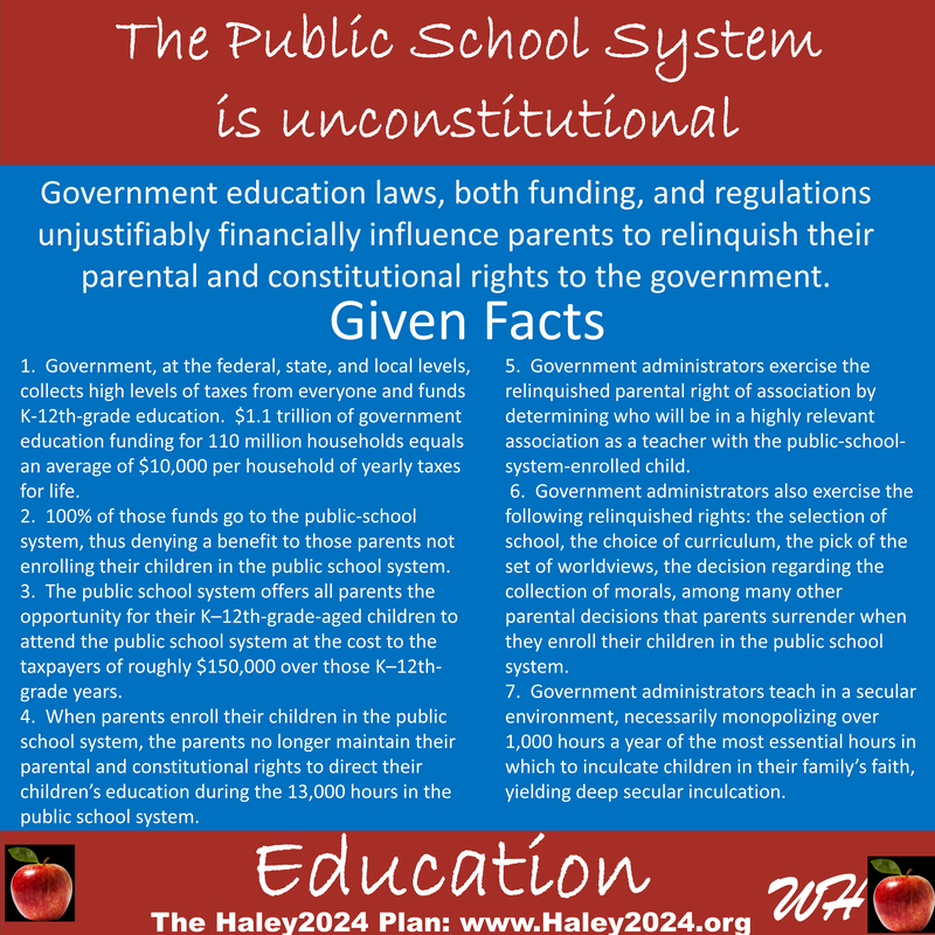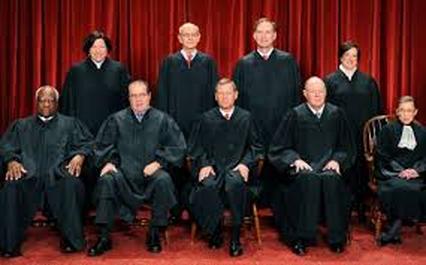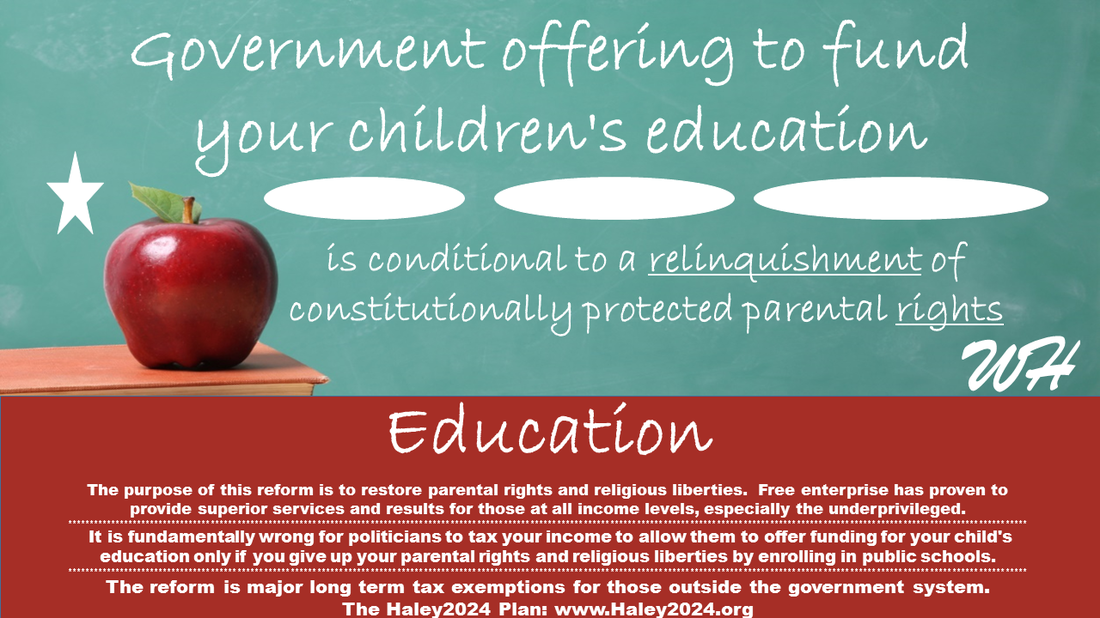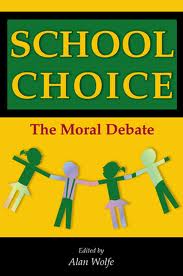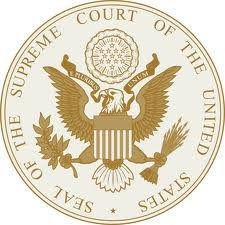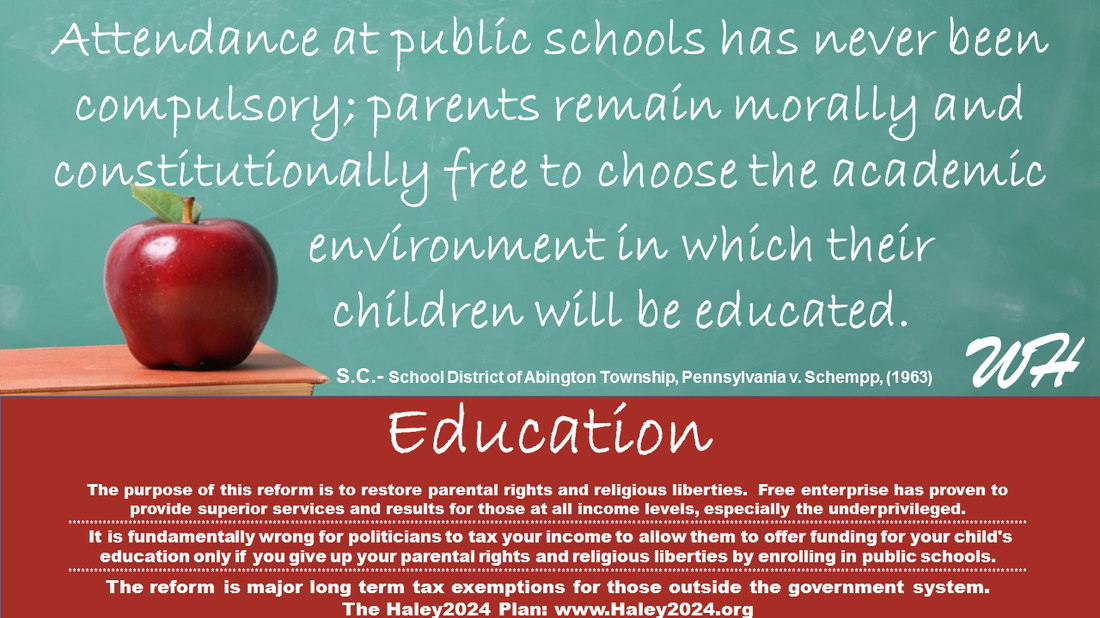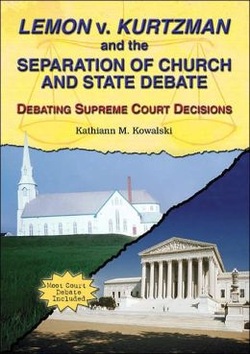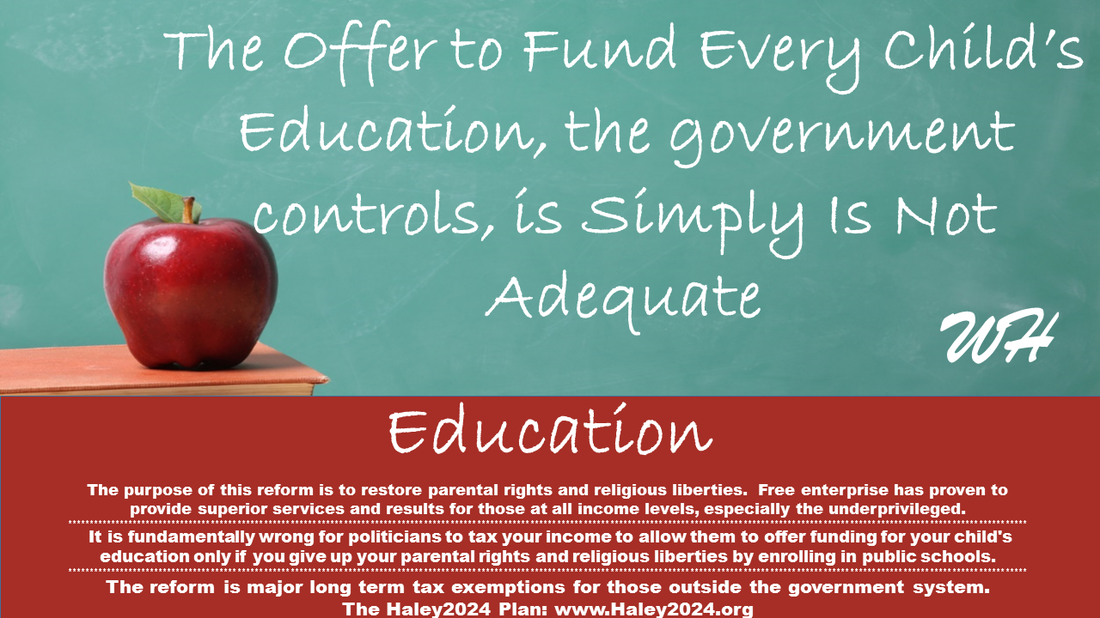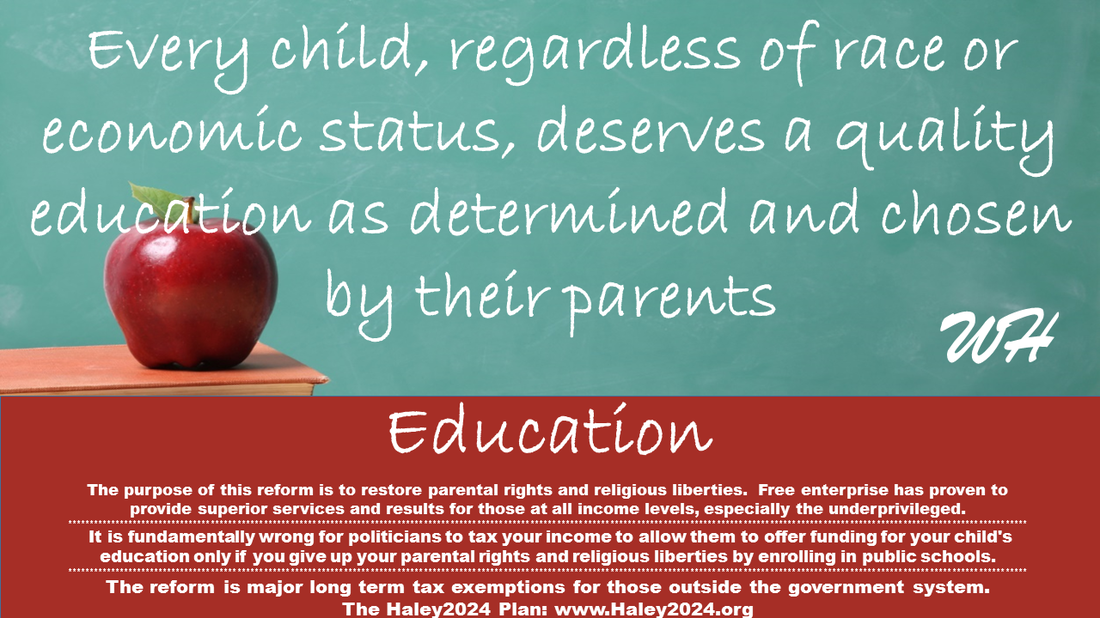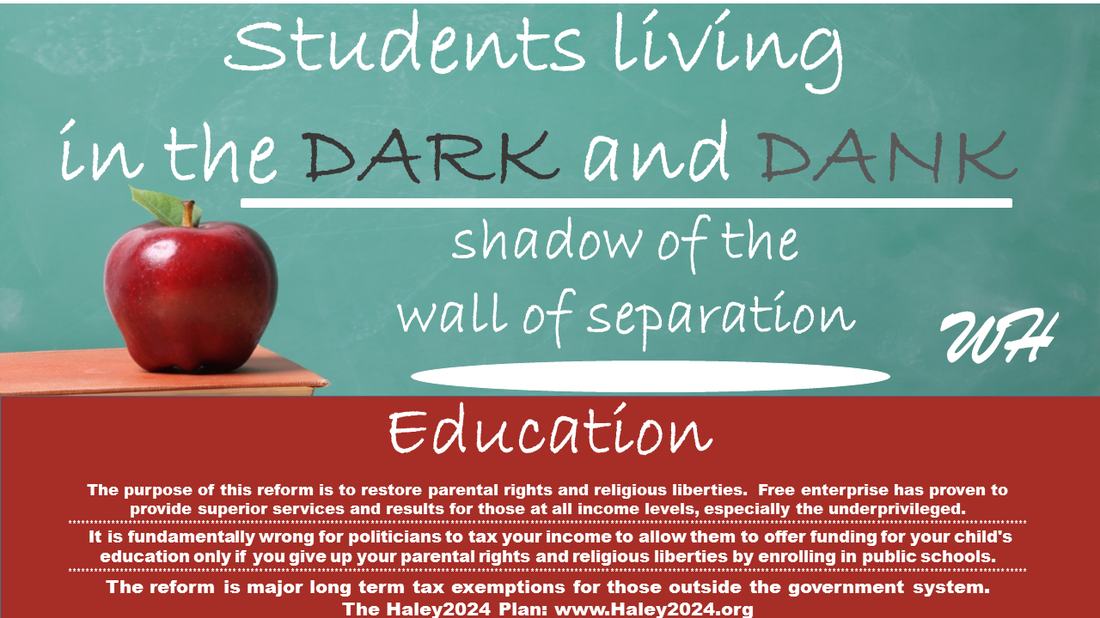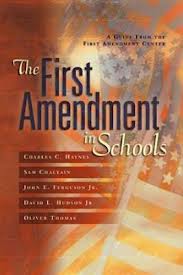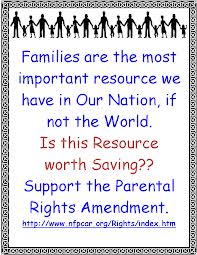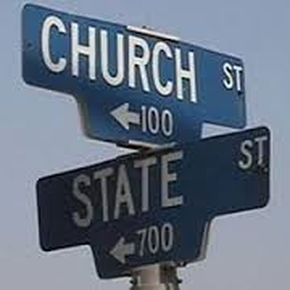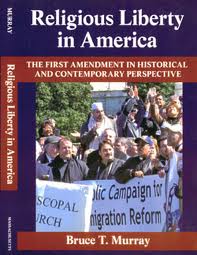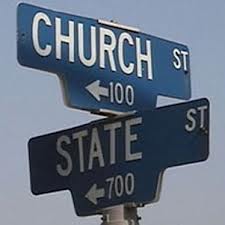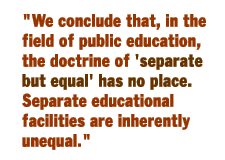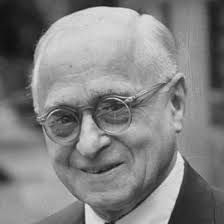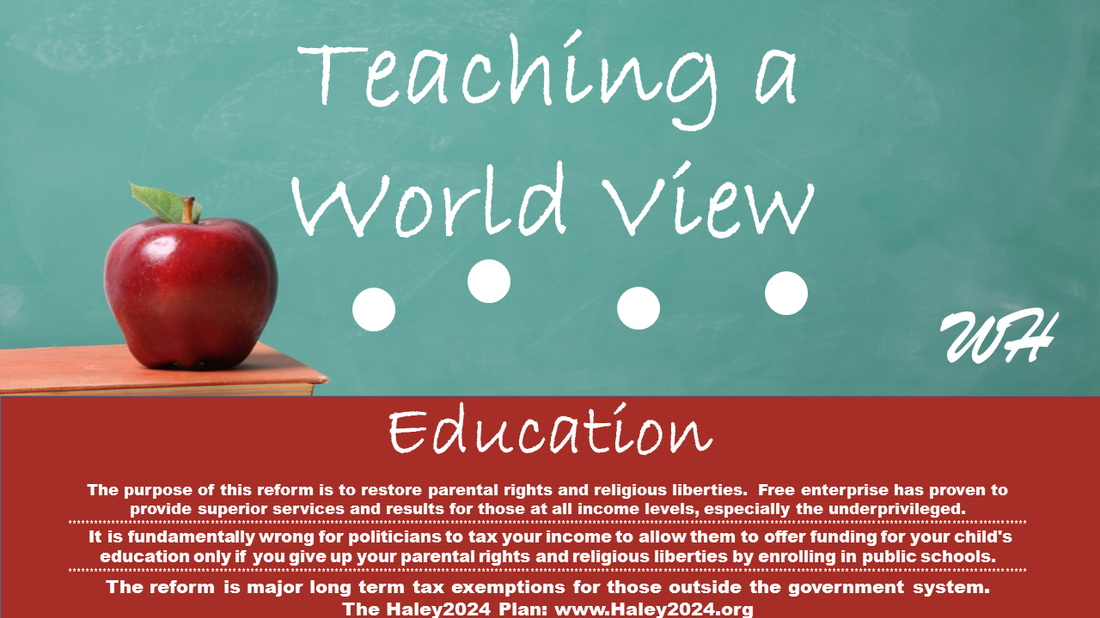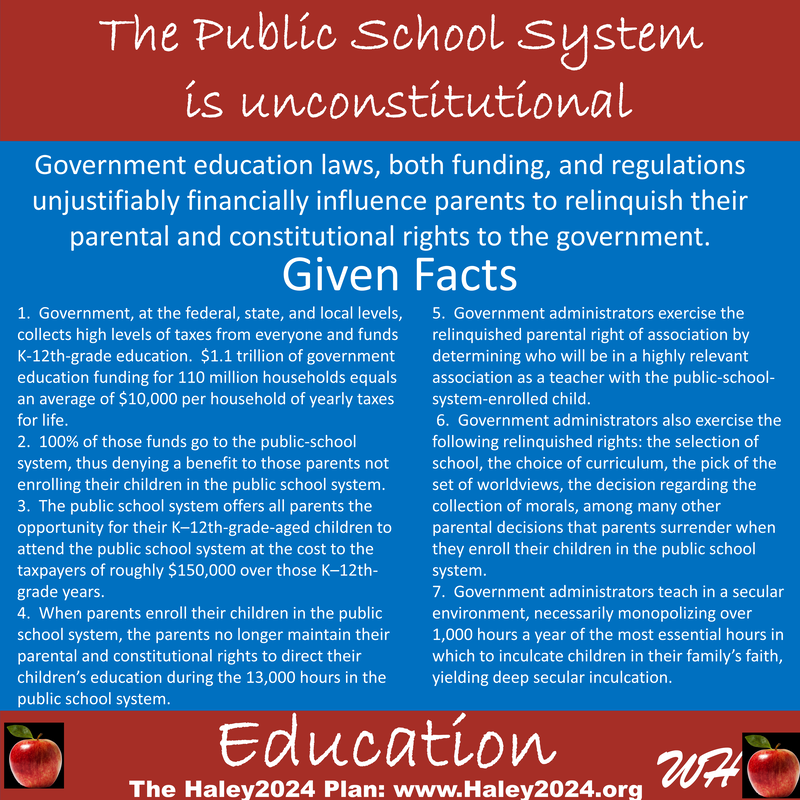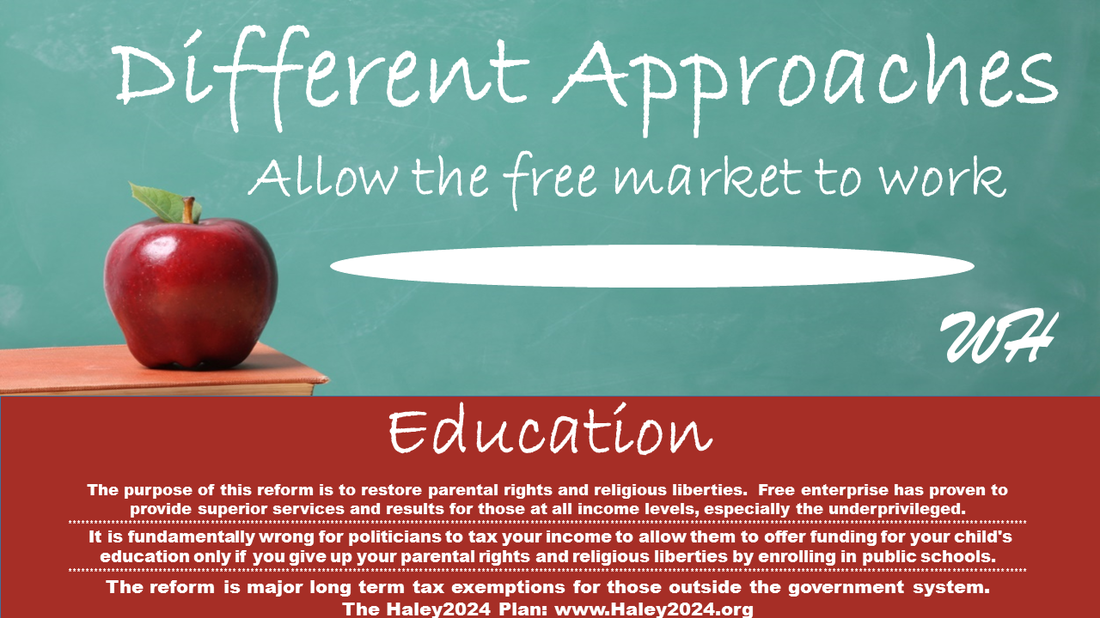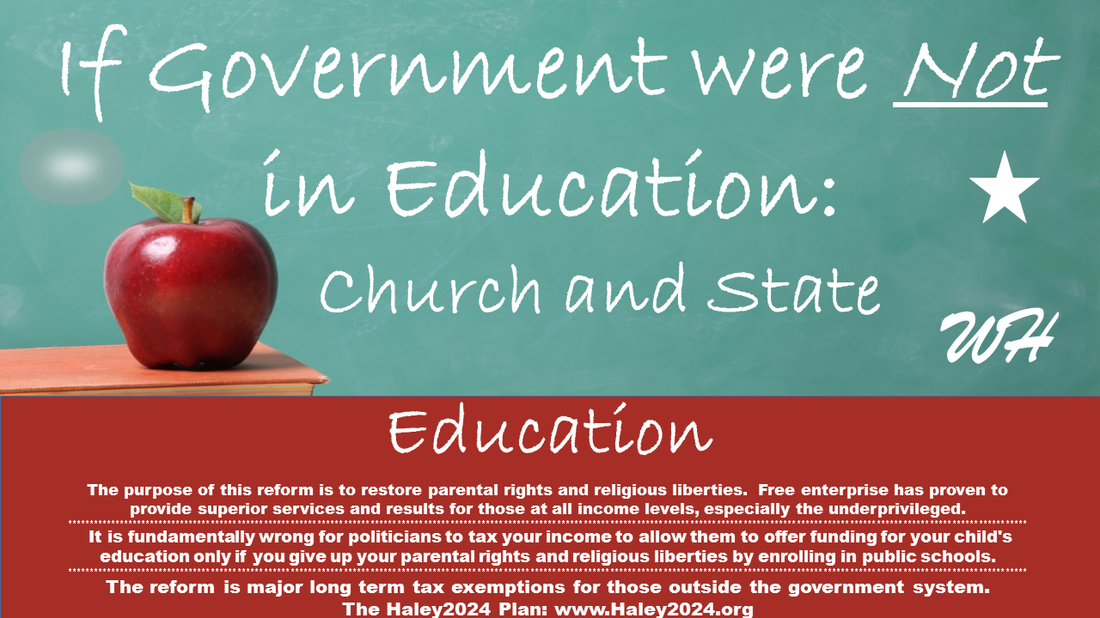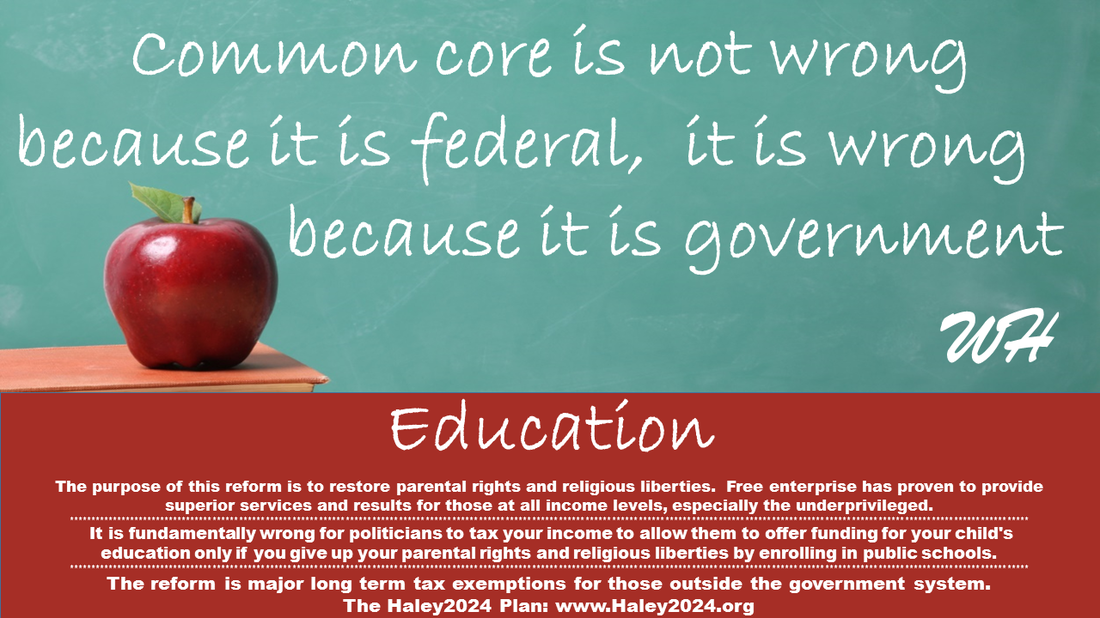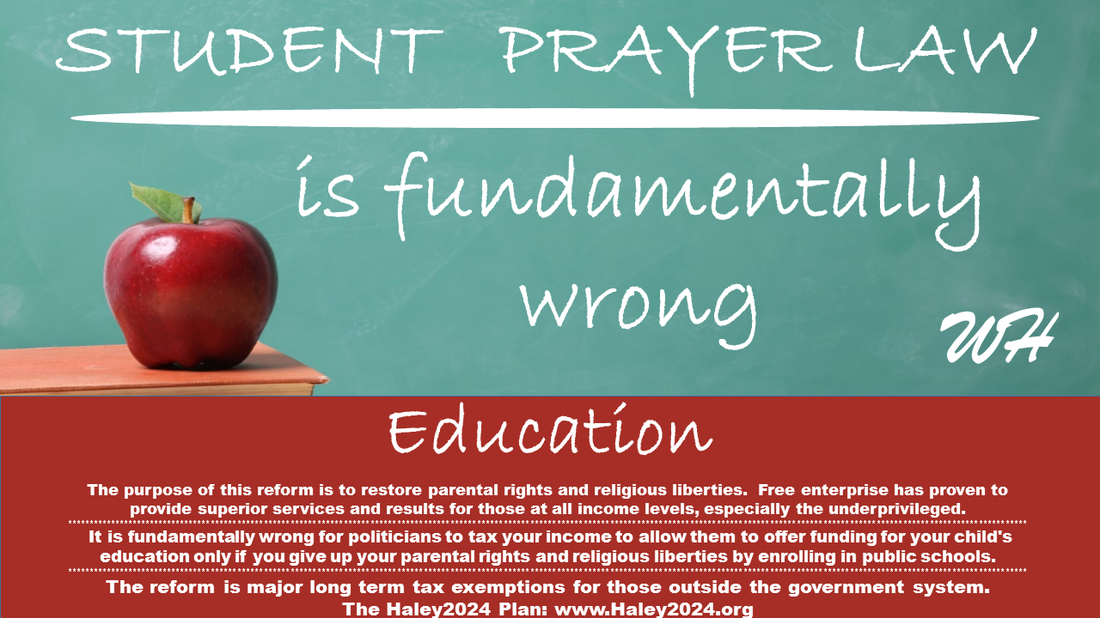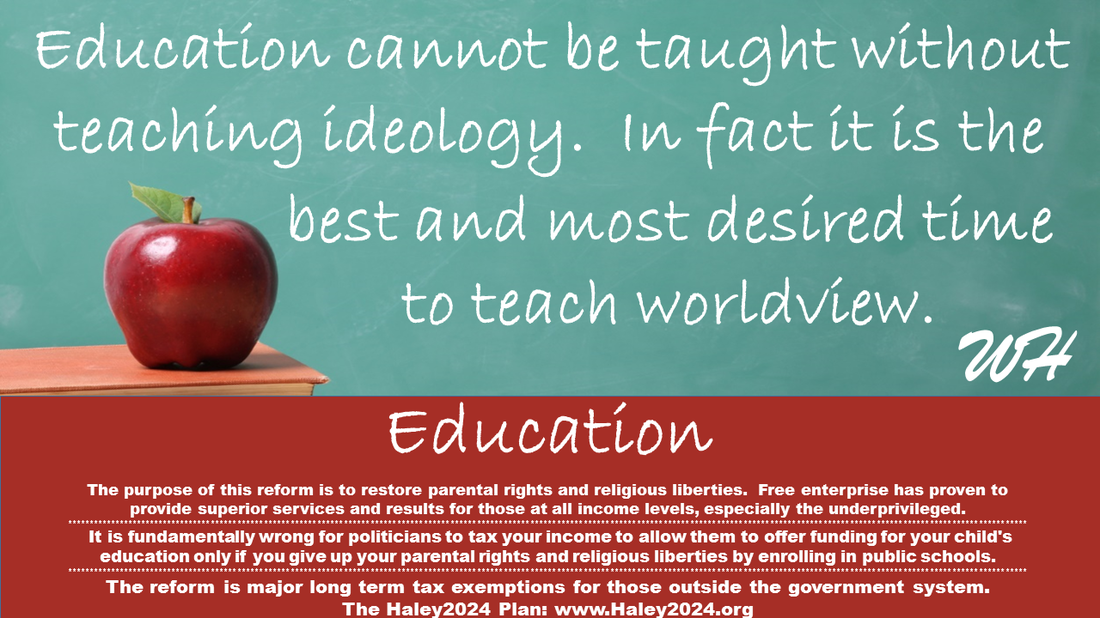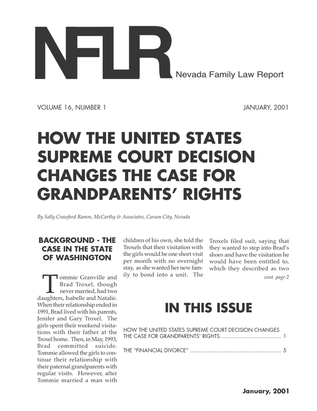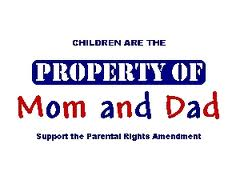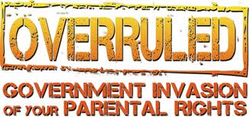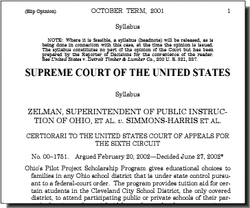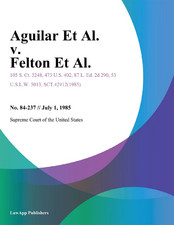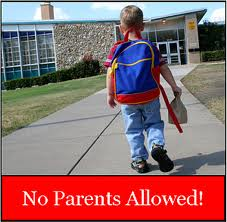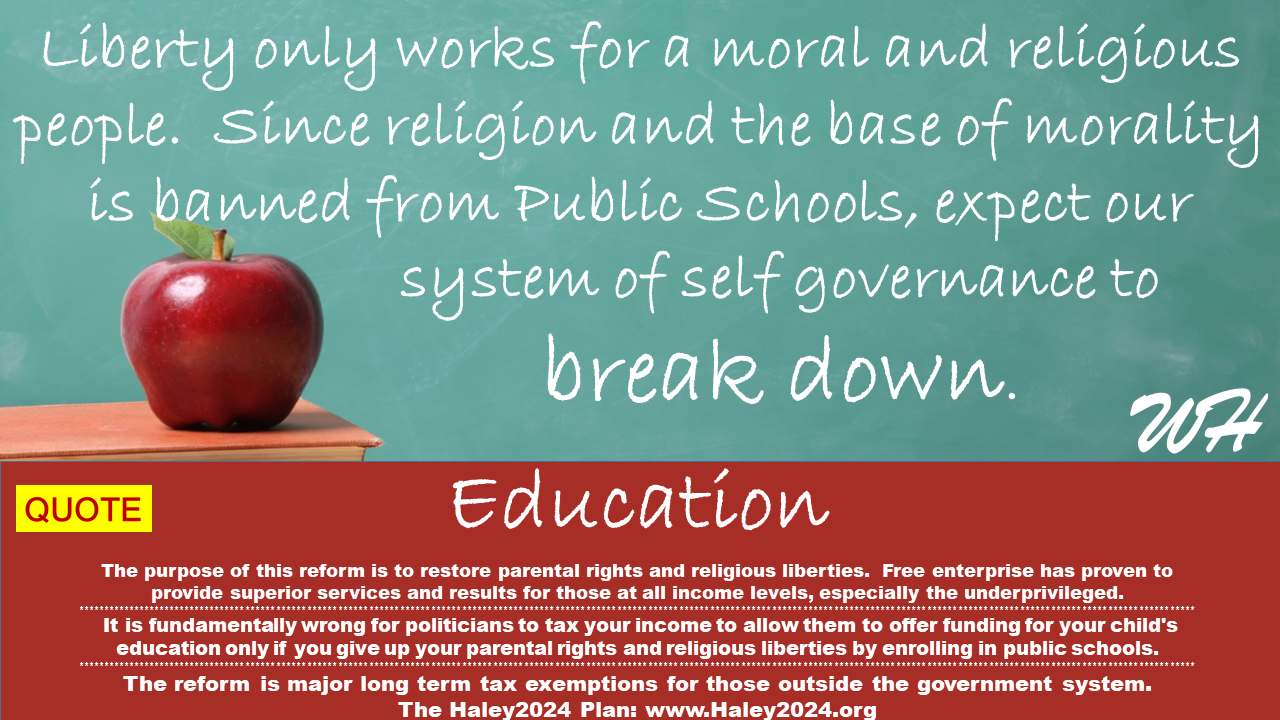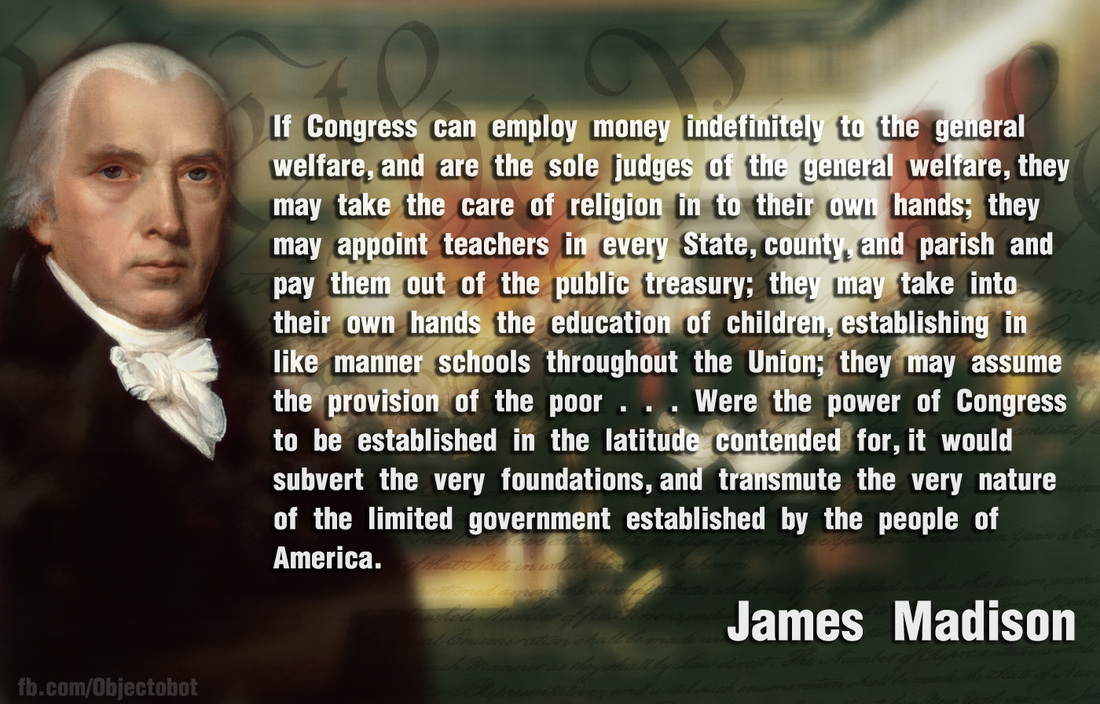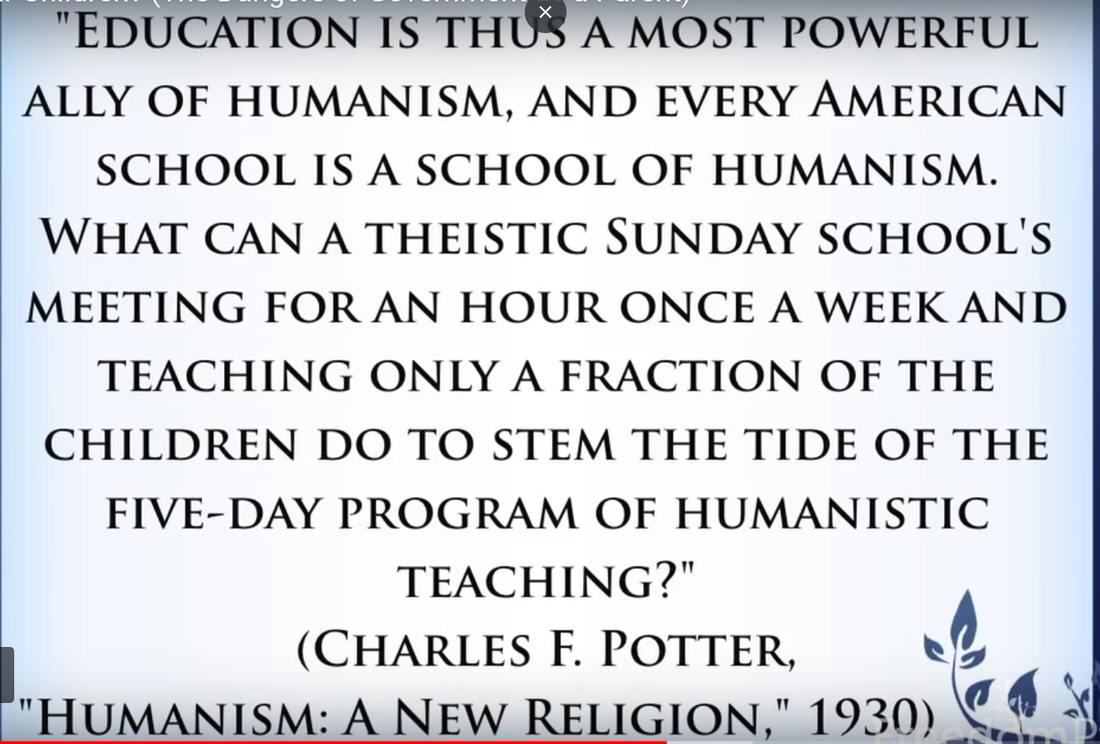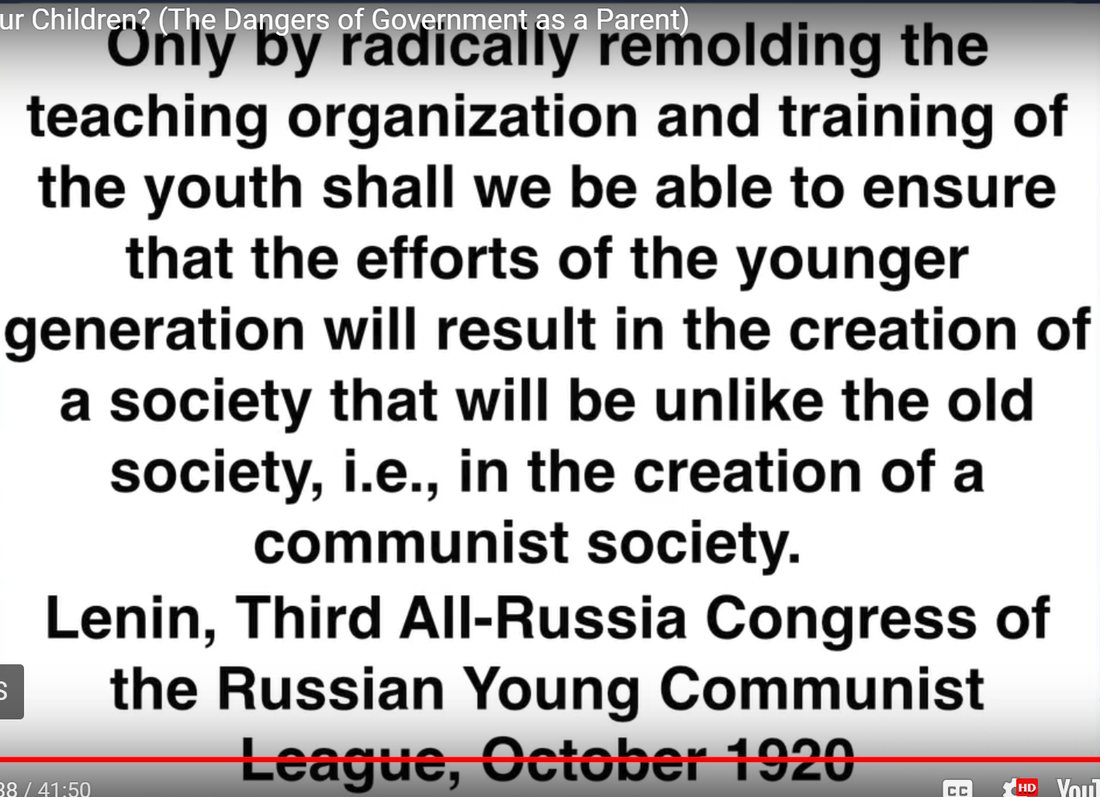The Public School System is unconstitutional
|
The public school system as it is currently structured violates many tests of constitutional law that the Supreme Court has handed down over the last 100 years. While I will make some comments, I will leave you to determine whether the Public School System can pass the tests. Please keep in mind that failing just one test means that the Public School System is unconstitutional. It fails all of these overwhelmingly. Please fully read and understand the ‘given facts’ below and apply to all ‘tests’ of constitutional violations.
|
This video is 8 minutes.
I go much more in-depth with an 1 hour 27 minute video below. |
Government education laws, both funding, and regulations unjustifiably financially influence parents to relinquish their parental and constitutional rights to the government.
Given Facts: These facts should always be considered when evaluating US Supreme Court tests of constitutionality
|
1. Government, at the federal, state, and local levels, collects high levels of taxes from everyone and funds K-12th-grade education. $1.1 trillion of government education funding for 110 million households equals an average of $10,000 per household of yearly taxes for life.
2. 100% of those funds go to the public-school system, thus denying a benefit to those parents not enrolling their children in the public school system. 3. The public school system offers all parents the opportunity for their K–12th-grade-aged children to attend the public school system at the cost to the taxpayers of roughly $150,000 over those K–12th-grade years. 4. When parents enroll their children in the public school system, the parents no longer maintain their parental and constitutional rights to direct their children’s education during the 13,000 hours in the public school system. |
5. Government administrators exercise the relinquished parental right of association by determining who will be in a highly relevant association as a teacher with the public-school-system-enrolled child.
6. Government administrators also exercise the following relinquished rights: the selection of school, the choice of curriculum, the pick of the set of worldviews, the decision regarding the collection of morals, among many other parental decisions that parents surrender when they enroll their children in the public school system. 7. Government administrators teach in a secular environment, necessarily monopolizing over 1,000 hours a year of the most essential hours in which to inculcate children in their family’s faith, yielding deep secular inculcation. |
|
|
This video is 1 hour 27 minutes. while I go in depth, I still felt I had much more to say.
The 8 minute video is above. |
The Supreme Court in Regan v. Taxation with Representation of Wash., 461 U.S. 540(1983) acknowledges a well established right when the opinion of the court stated: “TWR is certainly correct when it states that we have held that the government may not deny a benefit to a person because he exercises a constitutional right.”
|
Case: Pierce v. Society of Sisters, (1925)
School District of Abington Township, Pennsylvania v. Schempp, (1963)
Attendance at public schools has never been compulsory; parents remain morally and constitutionally free to choose the academic environment in which their children will be educated. The relationship of the Establishment Clause of the First Amendment to the Public School System is preeminently that of reserving such a choice to the individual parent, rather than vesting it in the majority of voters of each state or school district.
|
|
The choice which is thus preserved is between a public secular education, with its uniquely democratic values, or some form of private or sectarian education, which offers values of its own. In my judgment, the First Amendment forbids the state to inhibit freedom of choice by diminishing the attractiveness of other alternatives– either by restricting the liberty of the private schools to inculcate whatever values they wish, or by jeopardizing the freedom of the public schools from private or sectarian pressures.
|
|
The choice between these very different forms of education is one very much like the choice of whether or not to worship– which our Constitution leaves to individuals. It is no proper function of the state or local government to influence or restrict this choice. The lesson of history– drawn more from the experiences of other countries than from our own– is that a system of free public education forfeits its unique contribution to the growth of democratic citizenship when that choice ceases to be freely available to each parent. [p*243]
|
Case: Lemon v. Kurtzman, (1971)
|
Bill Haley: The baseline that needs to be considered when determining whether an advancement or an inhibition has occurred due to public school laws, is the baseline without the public school laws. Since there is nowhere where public schools do not exist, one has to look at history, the ten percent of parents currently opting out and the significant number of people who cannot afford to opt out, getting out when the financial burden is reduced and then going into church-related schools in high numbers.
|
|
Bill Haley: The facts stated in many major cases is that a high majority (90+%) of students who can afford to opt out of public schools, go to church-related schools, show that parents do not want their children academically educated in a secular environment. Also, voucher cases show the high percentage of parents who can not afford the whole tuition by themselves, choosing church-related schools once the financial discrimination is reduced. One can not come to any other conclusion, but that religion is being inhibited, thus a violation of the law.
|
Justice Douglas and Justice Brennan stated “secular education in a parochial school was an integral part of religious instruction and was inextricably intertwined with the schools’ religious mission.” Not being able to participate in a school, which intertwines religion into the secular education and being compelled to attend a school, which has a void of religion, inhibits religion and thus violates the First Amendment. |
Everson v. Board of Education of the Township of Ewing, (1947)
After establishing that academic schools affiliated with religion was the church, the court stated: Neither can force nor influence a person to go to or remain away from church against his will or force him to profess a belief or disbelief in any religion. .... No person can be punished for entertaining or professing religious beliefs or disbeliefs, for church attendance or non-attendance. ....On the other hand, other language of the amendment commands that New Jersey cannot hamper its citizens in the free exercise of their own religion. |
Board of Education v. Allen, 392 U.S. 236(1968)(USSC+)
The court stated: The test for the Establishment Clause is: what are the purpose and the primary effect of the enactment? If either is the advancement or inhibition of religion, then the enactment exceeds the scope of the Establishment Clause...
|
Agostini V Felton, (1997)
The Supreme Court stated that a state program would violate the first amendment of the federal constitution if it defined aid recipients by reference to religion so as to give the recipients any incentive to modify their religious beliefs or practices in order to obtain services.
|
United States v Fordice, 505 U.S. 717(1992)
Brown v. Board of Education, (1954)
McCollum v. Board of Education of School District, (1948)
Justice Frankfurter wrote on the public schools inhibiting religion. He wrote: “Laboring under financial difficulties and exercising only persuasive authority, various denominations felt handicapped in their task of religious education...... It was urged that, by appearing to make religion a "one day a week" matter, the [p*222] Sunday school, which acquired national acceptance, tended to relegate the child's religious education, and thereby his religion, to a minor role not unlike the enforced piano lesson..... the public school unduly monopolized the child's time”
|
|
He wrote: “I think it remains to be demonstrated whether it is possible, even if desirable, to comply with such demands as plaintiff's completely to isolate and cast out of secular education all that some people may reasonably regard as religious instruction.... But it would not seem practical to teach either practice or appreciation of the arts if we are to forbid exposure [p*236] of youth to any religious influences.
|
|
Music without sacred music, architecture minus the cathedral, or painting without the scriptural themes would be eccentric and incomplete, even from a secular point of view. Yet the inspirational appeal of religion in these guises is often stronger than in forthright sermon. Even such a "science" as biology raises the issue between evolution and creation as an explanation of our presence on this planet.
|
|
Certainly a course in English literature that omitted the Bible and other powerful uses of our mother tongue for religious ends would be pretty barren. And I should suppose it is a proper, if not an indispensable, part of preparation for a worldly life to know the roles that religion and religions have played in the tragic story of mankind.
|
|
The fact is that, for good or for ill, nearly everything in our culture worth transmitting, everything which gives meaning to life, is saturated with religious influences, derived from paganism, Judaism, Christianity -- both Catholic and Protestant -- and other faiths accepted by a large part of the world's peoples. One can hardly respect a system of education that would leave the student wholly ignorant of the currents of religious thought that move the world society for a part in which he is being prepared.
|
|
It is too much to expect that mortals will teach subjects about which their contemporaries have passionate controversies with the detachment they may summon to teaching about remote subjects such as Confucius or Mohammed. When instruction turns to proselyting and imparting knowledge becomes evangelism is, except in the crudest cases, a subtle inquiry. [p*237]”
|
TROXEL et vir. v. GRANVILLE (2000)
NAACP v. Alabama ex rel. Patterson, (1958)
The Supreme Court held that “It is beyond debate that freedom to engage in association for the advancement of beliefs and ideas is an inseparable aspect of the ‘liberty’ assured by the Due Process Clause of the Fourteenth Amendment, which embraces freedom of speech… Of course, it is immaterial whether the beliefs sought to be advanced by association pertain to political, economic, religious or cultural matters, and state action which may have the effect of curtailing the freedom to associate is subject to the closest scrutiny.”
|
Political, economic, religious and cultural matters are highly relevant reasons of why parents pick their children’s school.
|
HARRIS, et al v. ZELMAN (1999)
Aguilar v. Felton (1984)
Court stated the constitutional principle: that neither the state nor Federal Government shall promote or hinder a particular faith or faith generally though the advancement of benefits or though the excessive entanglement of church and state in the administration of those benefits.
|
School District v. Ball, (1985)
MITCHELL et al. v. HELMS et al., (2000)

